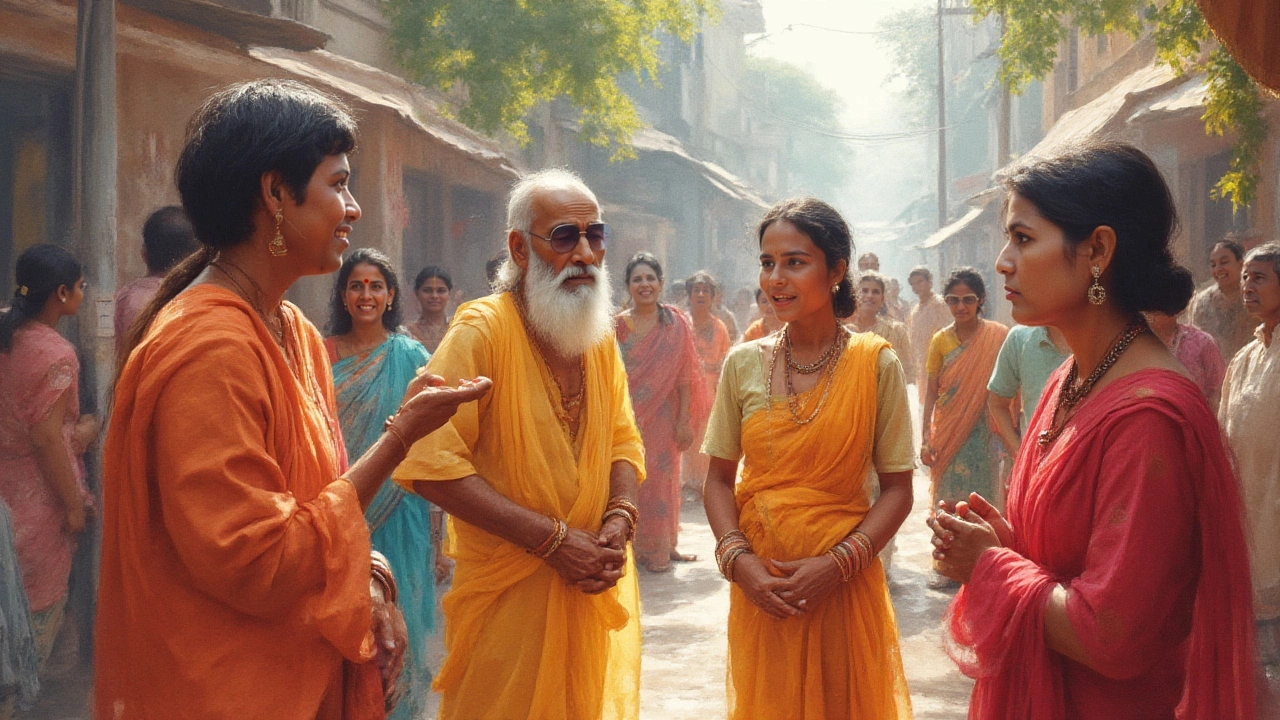What Does "Jee" Stand For? Hidden Meanings, Origins & Everyday Uses

Ever sat at a lively family gathering in India and noticed everyone adding "jee" at the end of sentences? Picture friends addressing each other with “Namaste-jee,” or grandkids calling their grandma “Dadi-ji.” The twist? That gentle suffix isn’t just another polite word. It’s a tiny linguistic powerhouse woven into Indian culture, oozing warmth, recognition, and respect. This isn't a trick with acronyms or a modern digital creation. It’s much older, and its journey through languages and cultures is anything but boring.
The Real Story: What Does "Jee" Stand For?
People often google "what does jee stand for" expecting a punchy acronym—Juicy Energy Elixir? Jokes aside, you won’t find “jee” cracking a code like that. Instead, it's a term rooted deep in the soil of Hindi and other Indian languages. In Hindi, "jee" (or जी) is a suffix used to show respect or affection when attached to names or statements. For example, calling someone "Rahul-jee" carries a world of politeness that just “Rahul” can’t manage.
Let’s smash a common myth right away: “jee” isn’t short for anything, and it’s not an abbreviation. Its true origin traces back to Sanskrit, where the word "jīva" (जीव) means “life” or “soul.” Over centuries, “jee” became a way for people to acknowledge each other’s inner being. It’s a way of saying, “I respect your presence, you matter.” Think about how, in English, adding “Mr.” or “Mrs.” before a name adds a formal touch—well, “jee” adds respect, but in a warmer, personal way.
Of course, it’s not just a Hindi thing. You’ll spot “jee” in Punjabi, Urdu, Gujarati, Bengali—you name it. Each culture gives it a slightly different flavor, but the theme of respect sticks. Unlike super formal language that sounds stiff, “jee” slips organically into daily talk. You’d use it to address elders, teachers, or anyone you’d rather not offend. In work emails or WhatsApp groups, tossing in a "jee" makes a request sound gentle instead of demanding. It’s politeness in a word.
Curiously, “jee” pops up even among friends or with people younger than you, mostly just to keep things light or playful. Some even joke that “jee” works like a universal adapter: respectful in every socket. But let’s not confuse it with “Ji,” the official spelling in Roman script. Sometimes you’ll see “jee” instead, because that’s just how it sounds in English. Both mean the exact same thing—spoken with the same intent, written with the quirks of English spelling. Don’t get tripped up by the difference; people use both without blinking.
A little taste of daily life: Someone shouts, “Sun-jee!” (“Listen, please!”) at a shop, or a shopkeeper greets a regular with “Namaste-jee.” At home, parents call out, “Beta-ji!” (“Dear child!”) when serving food. All these tiny “jees” aren’t just noise—they’re cultural glue.
Hidden Depths: Cultural Roots and Modern Evolution
The way “jee” works is pretty unique. It doesn’t just mark politeness — it reflects how relationships function in the Indian subcontinent. Respect isn’t just about age. It covers authority, position, and sometimes even affection or teasing. Want to see how language can make relationships spicy? Here’s what happens if you drop the "jee": a casual “Amit!” might sound cold, or worse, arrogant. Add "jee," and suddenly, you’re courteous. The difference is subtle but real.
According to data from a 2022 linguistic survey in India, more than 80% of respondents under 35 said they use “jee” at least once a day, usually when talking to elders or bosses. The twist? Nearly 60% admitted they also use it just for fun with friends—proof that the word isn’t fossilized; it's adapting. Urban youth might type "jee" in memes or sarcastically to joke with buddies: "Suno-jee, kya haal hai?" (“Listen, ma’am/sir, what’s up?”) They know how to blend respect with playful sarcasm—a balancing act older generations might find odd but cool nonetheless.
A run through Bollywood movies or TV soaps, and “jee” leaps off the scripts: “Mummy-jee, aapne khana khaya?” (“Mom, did you eat?”) Or the iconic “Haan-jee!” (“Yes, sir/ma’am!”) shot back as a standard answer that works everywhere, from classrooms to family dinners. Actors and public speakers lean on this word when they want to sound friendly or keep a polite distance. So, don’t be surprised if a famous cricketer thanks fans with, “Doston jee, aapka bahut shukriya!” (“Friends, thank you so much!”) in an Instagram live. That’s star power plus humility in three letters.
Some families keep “jee” as a hard rule; forgetting to use it with grandparents can earn you a sharp look. In other households, it’s faded a bit, replaced with playful nicknames or casual chatter. Both styles reflect how “jee” is flexible, bending to fit your comfort zone. If you’re unsure whom to use it with, here’s a tip: take your cues from the other person. If they call you “Beta-jee,” return the favor respectfully.
Immigrants and the global Indian diaspora carry this tradition worldwide. Whether you’re in London, New York, or Toronto, you’ll hear “jee” floating in Indian restaurants, temples, or even during video calls with family back home. It’s a cultural fingerprint that doesn’t vanish, even an ocean away. Over generations, “jee” might morph or mingle with other words, but the core meaning sticks—humble, kind, and utterly irreplaceable.

Official Spellings, Uses, and Fun Facts
Let’s clear up the spelling mess: “jee” and “ji” are just two sides of the same coin. Both are phonetic spellings of जी from Hindi. You’ll see “ji” used in most official documents, textbooks, and dictionaries. But “jee” captures the sound more genuinely for English speakers, which is why texts, social media, or informal chats lean that way. You might spot “Jee” in scripts, subtitles, or even as a fashionable supermarket brand name—proof that some words don’t just describe respect, they sell it.
Here’s an interesting table showing some common uses of “jee” versus “ji,” along with where you might spot these variants:
| Context | Common Usage | Preferred Spelling |
|---|---|---|
| Formal Letters | Respected Sir/Madam-ji | Ji |
| Text Messages | Hey-jee! Wassup-jee? | Jee |
| Brands/Business Names | Tea-Jee (Café) | Jee |
| School/Classroom | “Yes, Ma’am”-ji | Ji |
| Friendly Chats | Arjun-jee, yaar! | Jee |
One fascinating observation: foreigners who learn Hindi often add “jee” too liberally, tossing it everywhere out of fear of sounding rude. Locals, on the other hand, know just when to switch it on or off. If you’re learning Hindi, remember, “jee” can come off as over-the-top if dropped after every word. Soaked in the right situation, though, it makes your talk feel warm—like butter melting on hot paratha.
“Jee” also surfaces in some spiritual or religious phrases. In Sikhism, after the names of gurus, followers always append “jeeo” (or "jee") to signal honor—for example, “Guru Nanak Dev-ji.” During prayers, “Sat Sri Akal-ji!” rings out loud and clear. Even outside religion, when asking for someone’s well-being, Hindi speakers tack on “jee” to soften their words: “Aap kaise hain-jee?” (“How are you, sir/ma’am?”)
If you’re a trivia fan, here’s a stumper: The Indian national anthem ends with “Jaya he, Jaya he, Jaya he!” That’s not “jee,” but the feel is similar—praise and respect, all tied together in sound. That vibe of honor runs throughout the language, with “jee” as its most everyday expression.
For tech-savvy readers: “JEE” as ALL CAPS does exist, but it’s a totally different beast. In India, “JEE” means Joint Entrance Examination, one of the toughest college entrance exams around. Be careful not to confuse the two. Talk about “jee,” the word of respect, and “JEE,” the academic monster, in the same room, and you’ll get some raised eyebrows and nervous engineering students.
Making It Work: Practical Tips and Conversation Starters
So, when and how should you use “jee” without fumbling? Here’s a quick list for folks hoping to sound respectful—and not robotic—when chatting in Hindi or related languages:
- Stick “jee” on someone’s name to signal warmth—especially elders or authority figures. "Amit-jee, can I ask something?" feels worlds better than a plain “Amit!”
- If you don’t know someone’s age or preference, start with “jee.” If they drop it, you can follow their lead. It’s safer to err on the side of politeness.
- Don’t worry about getting it perfect. Even if you slip up, your effort will come across as sweet, not silly.
- For text messages and DMs, feel free to play with “jee” if you know the other person will get the joke.
- Mix “jee” with other words for creative greetings. “Hello-jee!” or “Good night-jee!” work fine as playful nods to tradition.
If you’re an expat or just traveling in India, using what does jee stand for as an icebreaker can spark fun conversations. Many Indians love explaining the cultural quirks of their language. They might tell you stories of how they used to sheepishly say, “Papa-jee,” when asking parents for extra pocket money, or how “jee” made their school teachers go easy on late homework.
Want to test your skills? The next time you watch a Bollywood film, listen for the “jee” and count how many times it pops up. Or, if you’re brave, toss it casually in a WhatsApp group and see who responds and how. Chances are, you’ll get a mix of genuine replies and a few good-natured laughs. That’s the charm of this three-letter wonder—adaptable, context-rich, and never out of style.
Write a comment